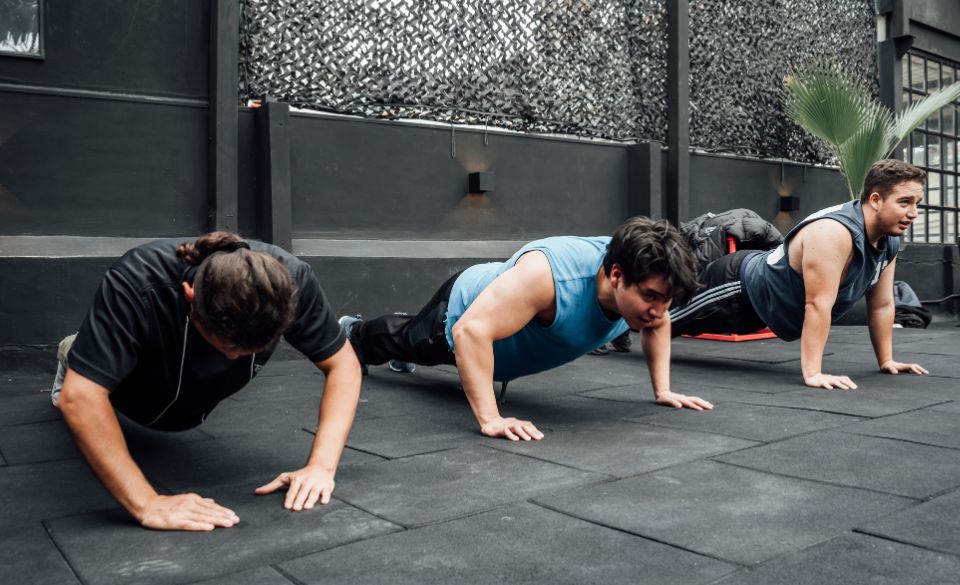
12 Fitness Tips for Men: Achieve Your Health and Fitness Goals
Page Contents
- 1. Set Realistic Goals
- 2. Mix Up Your Workouts
- 3. Prioritize Strength Training
- 4. Don’t Skip Cardiovascular Exercise
- 5. Fuel Your Body Properly
- 6. Get Sufficient Rest and Recovery
- 7. Stay Consistent
- 8. Pay Attention to Form and Technique
- 9. Monitor Your Progress
- 10. Stay Mentally Strong
- 11. Incorporate High-Intensity Interval Training (HIIT)
- 12. Listen to Your Body
- Commonly Asked Questions About Fitness
- Final Words
When it comes to fitness, men have their unique set of goals and challenges. Whether you’re looking to build muscle, lose weight, or improve overall health, incorporating effective strategies into your routine can make a significant difference. In this article, we’ll explore 12 practical fitness tips specifically tailored for men. Let’s dive in!
1. Set Realistic Goals
Setting realistic goals is essential for long-term success. Define what you want to achieve and establish clear, measurable objectives. Start with small milestones and gradually work your way up. This approach will keep you motivated and prevent discouragement.
2. Mix Up Your Workouts
Variety is key when it comes to fitness. Avoid getting stuck in a monotonous routine by incorporating a mix of cardio, strength training, and flexibility exercises. Try new activities such as swimming, cycling, or yoga to challenge different muscle groups and keep your workouts interesting.
3. Prioritize Strength Training
Strength training is vital for men’s fitness. It helps build lean muscle mass, increases metabolism, and promotes overall strength and power. Include exercises that target major muscle groups, such as squats, deadlifts, bench presses, and pull-ups, in your routine.
4. Don’t Skip Cardiovascular Exercise
While strength training is important, don’t neglect cardiovascular exercise. Engaging in activities like running, cycling, or brisk walking improves heart health, boosts endurance, and aids in weight management. Aim for at least 150 minutes of moderate-intensity cardio each week.
5. Fuel Your Body Properly
Proper nutrition is crucial for optimal performance and results. Ensure you’re getting a well-balanced diet that includes lean proteins, complex carbohydrates, healthy fats, and a variety of fruits and vegetables. Stay hydrated throughout the day and fuel your workouts with pre- and post-workout snacks or meals.
6. Get Sufficient Rest and Recovery
Rest and recovery are as important as exercise itself. Adequate sleep allows your body to repair and rejuvenate, supporting muscle growth and overall well-being. Aim for 7-9 hours of quality sleep each night and incorporate rest days into your training schedule to prevent burnout and reduce the risk of injury.
7. Stay Consistent
Consistency is key to achieving your fitness goals. Establish a regular workout routine and stick to it. Even on busy days, prioritize exercise and find creative ways to stay active. Remember, small efforts accumulated over time lead to significant progress.
8. Pay Attention to Form and Technique
Maintaining proper form and technique during exercises is crucial for effectiveness and injury prevention. Take the time to learn the correct form for each exercise and focus on maintaining it throughout your workouts. Consider working with a qualified fitness professional to ensure you’re performing exercises correctly.
9. Monitor Your Progress
Keep track of your progress to stay motivated and make adjustments as needed. Monitor your weight, measurements, strength gains, and overall performance. Celebrate your achievements along the way and use setbacks as opportunities to learn and grow.
10. Stay Mentally Strong
Fitness is not only about physical strength but also mental resilience. Develop a positive mindset, set realistic expectations, and stay motivated. Surround yourself with supportive people who share your fitness goals and engage in activities that help manage stress and promote mental well-being.
11. Incorporate High-Intensity Interval Training (HIIT)
High-Intensity Interval Training (HIIT) is a time-efficient and effective way to boost cardiovascular fitness and burn calories. Alternate short bursts of intense exercise with brief recovery periods. HIIT workouts can be performed with various exercises such as sprinting, burpees, or kettlebell swings.
12. Listen to Your Body
Above all, listen to your body. Pay attention to signs of fatigue, discomfort, or pain. If something doesn’t feel right, modify your workout or take a break. Pushing through injuries or ignoring warning signs can lead to more severe issues. Trust your instincts and prioritize your health and well-being.
Commonly Asked Questions About Fitness
Here are some frequently asked questions about fitness tips for men:
Q: How often should I work out?
A: The frequency of your workouts depends on your goals and fitness level. Generally, aim for at least 150 minutes of moderate-intensity cardio exercise or 75 minutes of vigorous-intensity cardio per week, along with two or more days of strength training. However, you can customize your workout schedule based on your availability and preferences. Just remember to allow for adequate rest and recovery between sessions.
Q: Can I target fat loss in specific areas, like my belly?
A: Spot reduction is a myth. You cannot target fat loss in specific areas of your body. Instead, focus on overall weight loss and body fat reduction through a combination of regular exercise, a balanced diet, and maintaining a calorie deficit. Incorporating strength training exercises that engage multiple muscle groups can help increase overall muscle mass and contribute to a leaner appearance.
Q: Should I take supplements for better results?
A: While supplements can be a part of some individuals’ fitness routines, they are not a substitute for a balanced diet. It’s important to prioritize whole foods and meet your nutritional needs through a well-rounded eating plan. However, if you feel that certain supplements may benefit you, consult with a healthcare professional or registered dietitian to determine if they are appropriate for your specific goals and health status.
Q: How can I stay motivated to exercise regularly?
A: Finding motivation can be challenging, but there are several strategies you can try. Set specific, achievable goals, and track your progress to stay motivated. Find an exercise routine that you enjoy and vary your workouts to keep things interesting. Establish a support system by exercising with a partner or joining fitness classes. Additionally, reward yourself for reaching milestones and focus on the positive impact exercise has on your overall health and well-being.
Q: Can I build muscle without lifting heavy weights?
A: Yes, you can build muscle using a variety of training methods, not just heavy weights. Bodyweight exercises, resistance bands, and other forms of resistance training can be effective for muscle building. The key is to challenge your muscles by progressively increasing the resistance or intensity of your workouts over time. Consistency, proper form, and targeting different muscle groups are important factors for muscle development.
Q: How important is nutrition in achieving fitness goals?
A: Nutrition plays a crucial role in achieving your fitness goals. It provides the fuel your body needs to perform and recover from workouts. A balanced diet that includes a variety of nutrient-dense foods is essential for optimal performance and results. Focus on consuming lean proteins, whole grains, fruits, vegetables, and healthy fats. Stay hydrated by drinking plenty of water and consider timing your meals and snacks around your workouts to optimize energy levels and recovery.
Q: Should I do cardio or strength training first?
A: The order in which you do cardio and strength training depends on your goals and preferences. If your main focus is building strength and muscle, it’s generally recommended to prioritize strength training first when your energy levels are higher. This allows you to give your full effort to weightlifting exercises. On the other hand, if your primary goal is cardiovascular fitness or weight loss, starting with a cardio session can help you warm up and burn calories before transitioning to strength training. Ultimately, the most important thing is to find a routine that you enjoy and can stick to consistently.
Q: How long does it take to see results from exercise?
A: The time it takes to see results from exercise varies from person to person. Factors such as your starting point, fitness level, consistency, and adherence to a healthy lifestyle all play a role. It’s important to remember that fitness is a journey and results may not come overnight. Generally, you may start noticing improvements in your energy levels, endurance, and overall well-being within a few weeks of consistent exercise. Visible changes in muscle tone or weight loss may take longer, typically a few months or more. Patience, perseverance, and a long-term mindset are key to achieving sustainable results.
Q: How can I prevent injuries during exercise?
A: Preventing injuries is essential for maintaining a safe and effective fitness routine. Start by warming up before each workout to prepare your muscles and joints. Gradually increase the intensity and duration of your workouts to give your body time to adapt. Use proper form and technique during exercises to avoid unnecessary strain on your muscles and joints. Incorporate rest days into your routine to allow for adequate recovery. Additionally, listen to your body and don’t push through pain. If you experience persistent or severe pain, it’s important to seek professional medical advice.
Final Words
Incorporating these 12 fitness tips into your routine will help you achieve your health and fitness goals. Remember that consistency, perseverance, and patience are key. Consult with a healthcare professional or certified fitness trainer for personalized advice and guidance. Stay motivated, stay committed, and enjoy the journey to a fitter and healthier you!


